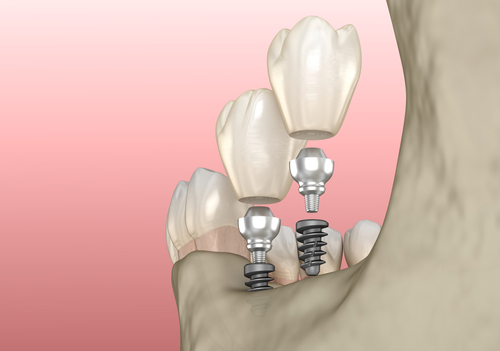A Revolution in Tooth Replacement
Missing teeth can significantly impact one’s quality of life, affecting confidence, speech, and the ability to chew properly. Dental implants have long been a preferred solution for tooth replacement, offering stability and durability. At Tuckerton Dental, our Tuckerton, NJ dentist, Dr. Ronald Petrosky offers mini dental implants (MDIs) as an exciting alternative, providing a less invasive and more affordable option for patients seeking to restore their smiles.
What Are Mini Dental Implants?
Mini dental implants are smaller versions of traditional dental implants. They consist of a titanium post, similar to conventional implants, but with a reduced diameter ranging from 1.8mm to 3.3mm. MDIs are designed to securely anchor dental restorations, such as crowns, bridges, and dentures, in the jawbone, providing stability and functionality similar to natural teeth.
Mini Dental Implants & Conventional Implants
The primary difference between mini dental implants and conventional implants lies in their size and surgical approach. Mini dental implants have a smaller diameter, which allows for a less invasive procedure, often eliminating the need for extensive bone grafting. As a result, the placement of MDIs is typically quicker, more comfortable, and requires less healing time compared to conventional implants.
Benefits of Mini Dental Implants
Minimally Invasive: MDIs require a less invasive procedure, reducing discomfort and healing time.
- Cost-Effective: Mini dental implants are generally more affordable than conventional implants.
- Quick Procedure: Due to their smaller size, MDIs can often be placed in a single visit, saving time for patients.
- Secure Denture Stability: MDIs provide a stable foundation for dentures, preventing slippage and enhancing chewing efficiency.
- Bone Preservation: The smaller size of MDIs makes them suitable for patients with limited bone density, as they may not require bone grafting.
Who Is a Candidate for Mini Dental Implants?
Mini dental implants are an excellent option for individuals who:
- Have lost one or more teeth.
- Suffer from bone loss or lack sufficient bone for traditional implants.
- Seek a more affordable tooth replacement solution.
- Desire a quicker and less invasive dental implant procedure.
- Need denture stabilization for improved comfort and functionality.
How the Procedure Works
- Initial Consultation: Your Tuckerton dentist will evaluate your oral health, take X-rays, and discuss treatment options.
- Implant Placement: On the day of the procedure, Dr. Petrosky will place the mini implants into the jawbone using a minimally invasive technique.
- Healing Process: Over the next few months, the implants integrate with the jawbone (osseointegration), ensuring stability.
- Attachment of Restorations: Once fully healed, dental restorations like crowns, bridges, or dentures are securely attached to the mini implants, completing the process.
Frequently Asked Questions
Yes, mini dental implants (MDIs) are designed to be as durable as traditional dental implants. Both types of implants are made of biocompatible titanium, which allows them to integrate with the jawbone through a process called osseointegration. This integration provides stability and strength to the implant, ensuring it becomes a solid foundation for dental restorations like crowns, bridges, or dentures.
No, the placement of mini dental implants is generally not painful. The procedure is considered minimally invasive, and patients usually experience minimal discomfort during and after the implantation process.
Yes, mini dental implants (MDIs) can be used to replace a full arch of missing teeth. MDIs are a viable option for individuals who need to support a denture or bridge to replace an entire row of teeth.
Transform Your Smile With Durability and Comfort at Tuckerton Dental!
Mini dental implants are an innovative solution for tooth replacement, offering a less invasive, cost-effective, and efficient alternative to traditional implants. With their remarkable benefits and broader candidacy, MDIs have revolutionized the field of dental implantology, restoring countless smiles and improving the lives of patients worldwide. Consult with your Tuckerton, NJ dentist by contacting Tuckerton Dental at (609) 296-1007 or by filling out our online form to determine if mini dental implants are the right choice for your oral health needs.
 Minimally Invasive
Minimally Invasive